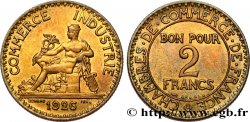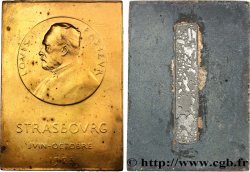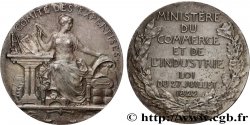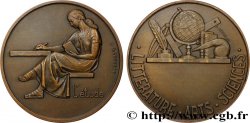fme_586774 - III REPUBLIC Médaille parlementaire, XIe législature, Charles Lacotte
无库存.
所有在网站上销售的产品 (2021)
价格 : 300.00 €
所有在网站上销售的产品 (2021)
价格 : 300.00 €
种类 Médaille parlementaire, XIe législature, Charles Lacotte
日期: 1914
铸币厂名称/城市 10 - Aube
材质 silver
纯度、成色(用角密度) 950 ‰
直径 51 mm
模子方针 12 h.
硬币制模工 DESCHAMPS Léon (1860-1928)
重量 63,87 g.
侧面 lisse + corne d’abondance 1ARGENT
印模 corne 1ARGENT
稀少度 R3
关于品相的说明
Patine grise hétérogène avec des taches noires. Traces de manipulation. Présence de quelques coups et rayures
正面
正面的文字 REPVBLIQUE - FRANÇAISE.
正面的说明书 Buste de la République à gauche, portant une couronne de laurier sur un bonnet de la liberté, tenant de sa main gauche un drapeau, de sa main droite une branche d’olivier reposant une table des droits ; en bas à gauche LEON / DESCHAMPS.
背面
背面的文字 CHAMBRE DES DEPUTES - 1914 // LACOTTE / AUBE.
背面的说明书 Faisceau de licteur entouré de feuilles et chêne et de laurier, devant un cartouche reposant sur deux têtes de lion sur lequel est inscrit en deux lignes le nom du récipiendaire et son département.
评论
Médaille attribuée en 1914 à Charles Lacotte, en tant que député de l’Aube. Il naquit à Rigny-le-Ferron (Aube) et décéda le 31 août 1943 à Evry-le-Châtel (Aube). Il se présenta sans succès aux élections législatives de 1906 et de 1910. Il fut élu député de l’Aube et exerça un premier mandat (à partir du 1er juin 1914). Il fut réélu député de l’Aube sous la XIIe législature (16 novembre 1919 au 31 mai 1924). Il se représenta aux élections législatives de 1924 mais battu il se retira de la vie politique. Il entama ensuite des études d’ingénieur et installa une fabrique de charcuterie à Ervy-le-Chatel.








 对产品描述纠错
对产品描述纠错 打印
打印 分享我的选择
分享我的选择 提问
提问 Consign / sell
Consign / sell
 产品介绍
产品介绍



